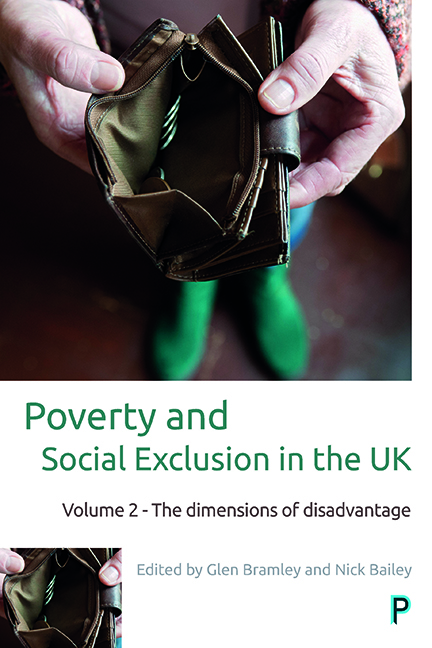seven - Poverty, social exclusion and civic engagement
Published online by Cambridge University Press: 12 April 2022
Summary
Introduction
Although political equality and political participation are basic assumptions of democratic theory, they are rarely combined in liberal democratic practice (Lijphart, 1997). Numerous random-sample surveys across these Western democracies have consistently demonstrated that participation in politics remains highly unequal, with socio-economic characteristics such as occupational class and educational attainment being key predictors of voting behaviour and more active participation (for example, Dalton, 2014; Marsh, 1990; Verba et al, 1995). These studies are also consistent with UK evidence showing political participation to be positively and strongly associated with socio-economic characteristics including higher socioeconomic status and educational attainment (for example, Parry et al, 1992; Pattie et al, 2004; Fieldhouse et al, 2010; EHRC, 2010). The enduring strength of this connection has led some to refer to socioeconomic status as the ‘standard’ or ‘baseline’ model of participation in the Western democracies (for example, Milbrath and Goel, 1977; Verba and Nie, 1972).
Since the responsiveness of political institutions and actors to public demands partly depends on citizen participation (Verba et al, 1995), systematic socio-economic inequalities in political participation mean that socially marginalised populations are in effect excluded from norms of effective democratic participation and representation. Inequalities in participation are most stark at the elite level, as reflected in the social characteristics of elected representatives to national assemblies, Parliaments and local authorities in the UK. Of MPs elected to Westminster in 2015, just 3 per cent had a manual occupational background, and over one third attended private (fee-paying) schools (Audickas, 2015). It is perhaps unsurprising therefore that, compared with manual workers, managerial and professional groups are considerably more likely to ‘feel that they can influence decisions affecting their local area’ (Taylor and Low, 2010).
However, to date poverty rarely features directly in debates about inequalities and political representation, and rigorous evidence in this area is limited. Recent years have seen increasing recognition of the importance of involving people experiencing poverty in the development of anti-poverty policies and practice (Lister, 2007a,b). This reflects growing acknowledgement of the importance of issues of recognition and voice in the experience of poverty and social exclusion (for example, Honneth, 1996; Fraser, 1995; Fraser and Honneth, 2003).
- Type
- Chapter
- Information
- Poverty and Social Exclusion in the UK Vol 2The dimensions of disadvantage, pp. 179 - 200Publisher: Bristol University PressPrint publication year: 2017
- 1
- Cited by

